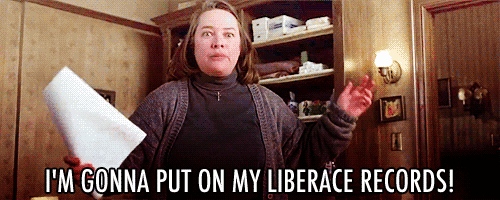You don't know what to do. You hate everything. Or (worst possible scenario) you are BORED.
You lost the spark in your writing. And you can't figure out why.
Before I tell you what to do, let me tell you a couple stories.
Stephen King is one of my all-time favorite writers, and this is one of my all-time favorite analogies, so bear with if you've already heard me deliver it. In Misery, King describes a writer named Paul who is being held captive by his biggest (read: craziest) fan. Writers often give their opinions about life and humanity through their work, and lots of people view Misery as a prime example of King telling the reader what it is like to be a writer.
The line that stuck out to me from Misery is, “Paulie, can you?” You see, Paul's problem is that he killed off his main character and ended a long-running series. Annie, the fan who "rescued" him from a car accident, is insisting that he write himself out of that corner and resurrect poor Misery Chastain, or be killed off himself. And of course, Paul is thinking, "How do I get Misery out of her coffin and back in the land of the living?"
Paul doesn't want to write any more Misery books. That's why he killed Misery. But in this one instance, he really, really has to.
In his drug-addled, foot-chopped-off condition, Paul starts hallucinating about a memory from kindergarten when the little kids played a game where one started a story, and the next kid added to it, and then the kid after that, and so forth. Paulie, can you?
And the point of the game wasn’t to come up with some Pulitzer-prize winner or a New York Times bestseller ... it was just to keep the story going. “Can you, or can’t you?” And if you can’t, the game is over (and in poor Paul’s case, you’re going to be murdered and chopped up into little bits.)
Writing, whether you're plotting or pantsing, is sort of like a game of “Can you or can’t you.” If you want to be a good writer, all that really matters is if you “can.” You may be a genius with the ability to write prose that would make Shakespeare weep, but if you “can’t” on a consistent basis, then you can’t. People who put in the time and effort, and are honest with themselves, will always be able to get to the point where they “can” on a consistent basis.
Look at this one other way (not to belabor the point). A friend of mine is a computer programmer, and he pointed me to this anecdote:
"A ceramics teacher announced on opening day that he was dividing the class into two groups. All those on the left side of the studio, he said, would be graded solely on the quantity of work they produced, all those on the right solely on its quality. His procedure was simple: on the final day of class he would bring in his bathroom scales and weigh the work of the "quantity" group: fifty pound of pots rated an "A", forty pounds a "B", and so on. Those being graded on "quality", however, needed to produce only one pot - albeit a perfect one - to get an "A".
Well, came grading time and a curious fact emerged: the works of highest quality were all produced by the group being graded for quantity. It seems that while the "quantity" group was busily churning out piles of work - and learning from their mistakes - the "quality" group had sat theorizing about perfection, and in the end had little more to show for their efforts than grandiose theories and a pile of dead clay."
The lesson, of course, is whether you're writing books or code or throwing pots, the more you do, the better you are.
So what to do when you've felt the spark go out in your writing? Well, I think you have a few options.
1. Take a mental palate cleanser. Go for a walk. Play a game. Read a book. Watch (good) TV. No Keeping Up With The Kardashians, we're talking Breaking Bad or Parks and Rec or nothing. If it doesn't make you think (and I do mean THINK) about something different for awhile, it's useless to you.
When you feel refreshed, return to the writing. And if you still don't feel the spark, go to Step 2.
2. Quit making excuses and start typing, Paulie. Remember our pal Paul and his dilemma? Do you think it mattered to him that he hated Misery and hated that she couldn't ever pick between Ian and Geoffrey and he wished he'd never started the stupid series? NO! His foot was about to be chopped off! So just write for awhile, like your ability to remain ambulatory depends on it. And after awhile, evaluate whether that worked. If it didn't, go to Step 3.
3. Take everything you've just written and put it in your "Extras" folder. I have a theory that no writer really ever deletes anything. I can't bring myself to erase pages (and days) of hard work. Usually when something has to go, I put it in what I call my "Extras" folder.
This is helpful for two reasons. One, you never know when something you wrote in that folder will be helpful after all. (It's happened to me a few times.) Two, it's nice to have a tangible (as tangible as a computer file is) reminder of all the pots you've thrown. Now move to Step 4.
4. Continue your current story in a different spot. So you've gotten yourself bogged down. Your main character is trapped on the top floor of the house and the murderer is in the kitchen, and there's no way she can get outside without passing him. You don't know what to do, and the more you think about it, the more you want Det. Ex Machina to show up and save the day because you're so confused/frustrated/bored
.
This is what I want you to do: type "XXX," then hit your return/enter key a couple times and start somewhere else. Oh, now your main character is having a sweet moment with her love interest. Oh, now you're revealing how the bad guy left fiber evidence behind at the scene. Oh, now you're describing a really awesome road trip that actually has no place in your novel, but at least you're stoked to be writing it!
When you're done, all you have to do is find all the spots you typed XXX and fill in your gaps. Usually you're going to find that those spots aren't nearly as bad as they were the first go-around. Did that work? If not, skip to Step 5.
5. Stop. This book is an abandoned pot. Don't feel bad about it, because the more pots you throw, the better writer you're going to be. But don't keep coming back to it, because if this project isn't ever going to hold water properly (the analogy has now gone too far ...) you're wasting your time. Who wants to agonize over an unfinished pot? Save it in a file on your desktop somewhere and move on to your next project. Someday you might find some use for it, or not. But don't feel bad about moving on.
Go make something else!




No comments:
Post a Comment